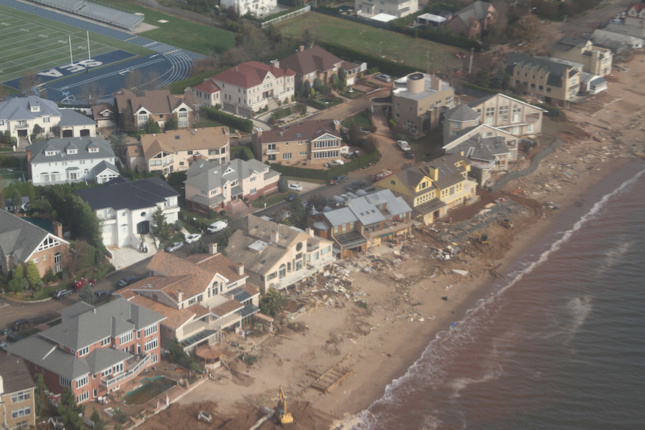On January 18, President Donald Trump took to Twitter and made clear his feelings about a proposed $119 billion—later downgraded to $62 billion—proposed seawall with retractable gates that would stretch six miles across Lower New York Bay The system would shield low-lying areas of New York City and New Jersey from the same type of catastrophic flooding unleashed by the storm surge of Hurricane Sandy in 2012. That storm, which wreaked havoc up and down the Mid-Atlantic coastline, resulted in roughly $19 billion in damages in New York City alone.
Trump called the idea, one of five flood-blocking proposals being studied by the Army Corps of Engineers, “costly, foolish and environmentally unfriendly.” He went on to claim that the barrier “probably wouldn’t work anyway,” before going on to warn New Yorkers to “get your mops and buckets ready.” In his tweet, an obvious reaction to a New York Times story on the sea wall published the day before, he also misstated the proposed cost of the deluge-preventing defense system to be $200 billion.
A massive 200 Billion Dollar Sea Wall, built around New York to protect it from rare storms, is a costly, foolish & environmentally unfriendly idea that, when needed, probably won’t work anyway. It will also look terrible. Sorry, you’ll just have to get your mops & buckets ready!
— Donald J. Trump (@realDonaldTrump) January 18, 2020
Just weeks later, a crucial study considering that plan, as well as the four less intensive and expensive proposals, have been abruptly and “indefinitely postponed” by the Corps.
As the New York Times reports, the announcement took some of the Corps’ own officials by surprise, while “local politicians and advocates said the decision was stunning at a time when climate change is threatening New York’s future with intensifying storms.”
The project was first initiated by the Corps in 2017. Per Gothamist, it was anticipated that they would release a feasibility report as soon as this summer detailing the proposals, costs and benefits, and other information. And, even if a specific long-term plan were to be hypothetically approved and green-lit for federal funding, it could take upwards of two decades to complete such a project.
As the Times noted, Trump cannot personally nix ongoing projects within the Corps. Work plans for the agency are jointly decided by Corps officials, the Department of Defense, and the White House Office of Management and Budget, while funding for their projects is allocated by Congress. But considering the previous Tweet, the President’s apparent antagonism toward infrastructure projects that would benefit his hometown, and his apathy toward climate resiliency projects that require federal funding, it’s difficult not to speculate that the move was orchestrated by Trump himself.

“We can only speculate, but I think the tweet gives a clue as to the reason,” Robert Freudenberg, vice president for energy and environment with the Regional Plan Association, explained to the Times. “This is a president who gets good headlines for his base out of acting against ‘blue’ states, and there’s a disturbing pattern of stalling or trying to end projects that are important to the Northeast.”
“This doesn’t happen,” added Freudenberg. “This is an in-progress study.”
Even the Corps official in charge of the project, which only focused on flooding from Sandy-like storm surge but not sea-level rise or stormwater runoff (to some criticism), expressed how abnormal it was for an ongoing project to be shelved and have its funding suddenly halted.
“When you’re working on something, you never like to be caught in a position where you’re shut down in the middle before you even finish your mission,” said Clifford S. Jones III of the agency’s New York office.
Speaking to the Times, a senior administration official dismissed any notions of a personal vendetta on Trump’s part, and claimed that the Corps’ flood defense study was, in their words, “too expensive and unfocused.” The official went on to claim that the White House “remains committed to helping communities address their flood risks.”
Calling the halting of the project “reckless,” New York City Comptroller Scott Stringer, who has been critical of the project’s limited scope, told the Times that “there is no other study underway at this scale that could give federal dollars to protect our people, our businesses and our ecosystems.”
Senate Minority Leader Chuck Schumer of New York also expressed his dismay with the decision in a press statement: “The administration is being penny-wise and pound-foolish by not funding the studies that allow New Yorkers to prepare for the next superstorm. There was no reason given for these cuts—because there is no answer.”











